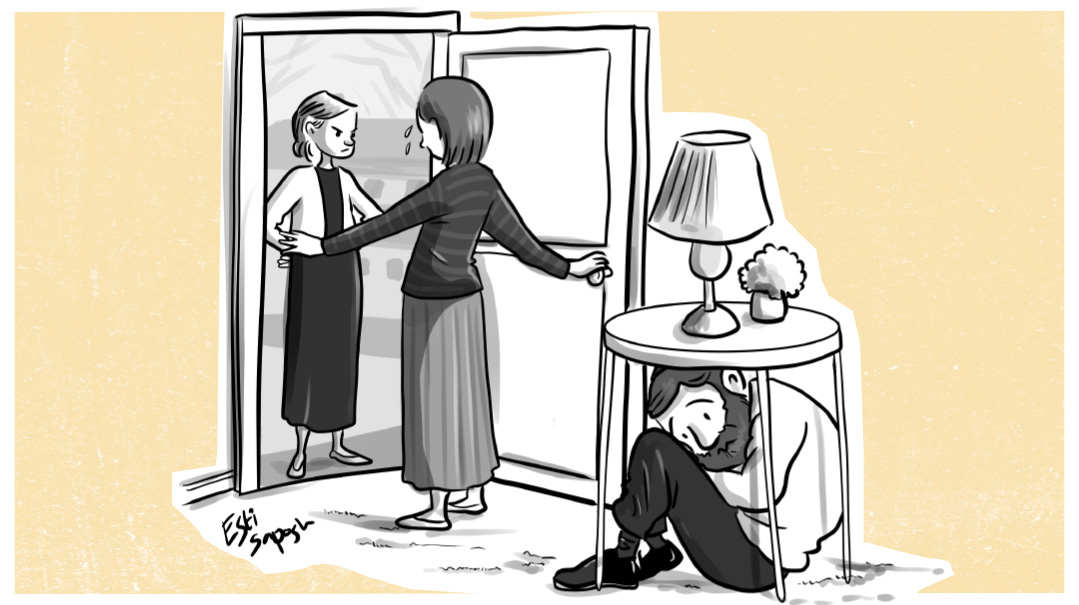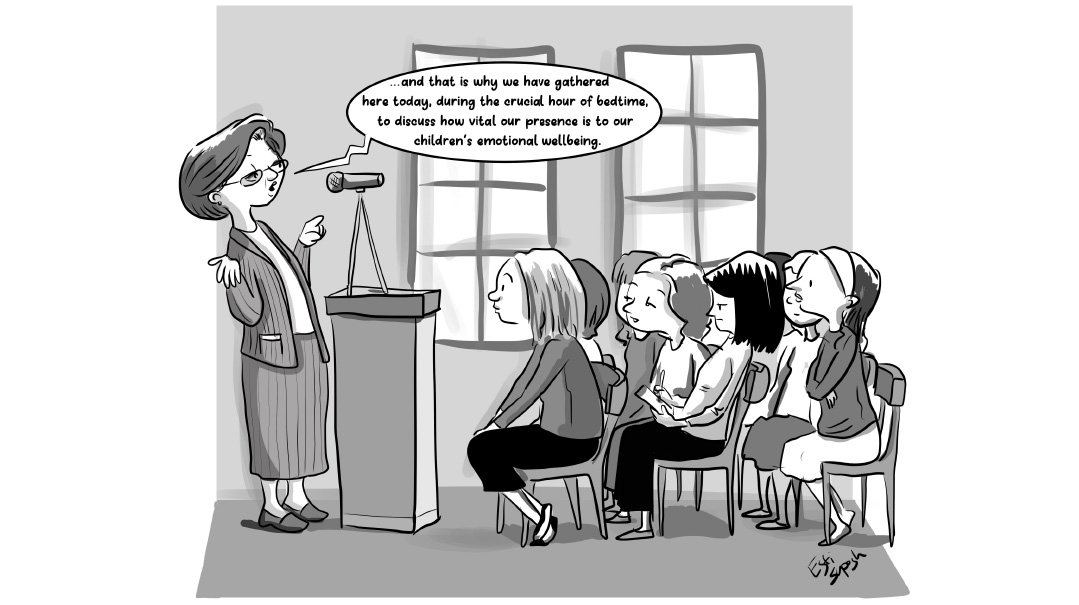“My Husband Won’t Let Me Tell Anyone He Lost His Job — Even His Family”

Seems to me that you and your husband need to have a conversation

My sisters-in-law and I are super close, but they don’t know that we’ve been struggling with parnassah ever since my husband lost a huge account at work a few months ago, and he forbids me from telling them. They’re planning a short girls’ getaway with our mother-in-law for a big birthday she has coming up, but I straight up can’t afford to join. What should we do?
Answer
I’m going to need some definition of terms here. When you say, “super close,” do you mean you share memes all day but have no idea what’s actually going on in each others’ lives? Or do you mean you share deep thoughts and feelings and feel connected emotionally?
Also, about that “we” in “What should we do?” Does that mean your husband is willing to be part of this solution?
Seems to me that you and your husband need to have a conversation. I like to adjoin a “yes” to a “no” whenever I can. When your husband asks you to refrain from telling them about your current financial status, does he also suggest another possibility for what you can say to them? What are his thoughts about how to celebrate his mother’s milestone birthday?
It seems like you’ve been thrust into the middle of an untenable dilemma where you really want to protect your husband’s dignity, and yet you still need to show up in a way you can’t. Have the two of you discussed this? Is there a way you can share your dilemma that shows him that his wishes are your priority, but that you need him to be part of the solution?
Once the two of you brainstorm, let’s get back to you and your super close sisters-in-law. Do you have the sort of relationship where someone can make a request and the rest of the clan accepts it without explanation? Can you say that you really want to be part of the celebration but that this year you need to stay local? Let their imaginations go where they might; maybe they’ll assume finances, maybe they’ll think one of your kids is struggling, maybe they’ll think you’ve developed a secret fear of flying. The point is, they won’t really know. And perhaps if they agree to stay local, you can offer to do something inexpensive that will really make the occasion special, like a Snapfish album with a message from every child and grandchild.
There are some families that would respect that without further inquiry and others that would prod. If you belong to the latter, would your husband consider letting you confide in just one sister-in-law, perhaps one who might be able to pay your share until you can repay it? I’m not generally an advocate of spending money you don’t have, but you and your husband would have to decide if this is something worth doing it for.
There are plenty of sly alternatives to this dilemma, but I’m not a fan of any of them. I believe conflicts like this are a rich opportunity for deep and meaningful connection. This is your chance to demonstrate to your husband that you are on his team, that his needs come first, and that you need him to be part of the solution. Ideally, on his own, he would come to the conclusion that there is no shame in parnassah struggles — money comes and money goes, as per Hashem’s decree — and he would consider being honest with his sisters. But if not, the two of you can still be partners in coming up with a plan that allows you to be part of celebrating your mother-in-law.
My cousin has a home catering business, and I’m making my first bar mitzvah. I should probably patronize her, but objectively speaking, her food just isn’t as good as the competition’s. Do I need to suffer to be a good cousin?
Answer
TO paraphrase and mangle an otherwise great quote: Catering is inevitable, suffering is optional.
All kidding aside, if you approach this chesed as a martyr, neither of you will end up feeling good about it. Giving someone parnassah is the highest level of chesed, and doing this for your cousin is a huge gift. But it needs to feel right for you, or the resentment will mar any good feelings.
Is there some way to create a hybrid event? Perhaps you can let her do the hospitality/toameha on Erev Shabbos and get your preferred caterer for the kiddush and seudos. And never underestimate the power of communication. You can do her a real chesed by providing direction and feedback that could improve her business.
If you can stretch and do this with a full heart, go for it. And in the zechus of your good cousinship, may you experience no suffering.
I have a friend who is more of a meek, submissive type, a real people-pleaser with a tendency to put herself down. I know her marriage isn’t great, but I don’t get involved. The other day, however, we were talking, and she told me that her husband made some comments about her weight. Later, when they were talking about Yom Tov expenses, he said, “Well, I would happily pay you 500 dollars if you could just lose 20 pounds.” I was horrified — but once again I kept my mouth shut. Am I enabling a bad dynamic by not saying in a forceful way, “This is not okay, and you should let him know that you won’t tolerate it”?
Answer
Ouch. That’s hard to hear.
Imagine how hard it was for her to hear. And to hear on a regular basis. And how humiliating it will be for her to realize that someone just got a glimpse into the pain that is her marriage.
Sometimes we want to jump in and say something to make ourselves feel better. To feel like we did something. Like we were part of bringing about change.
But that is not how change really works.
Change is a slow fermenting process that thrives in a warm, safe environment. The emphatic “This is not okay” and “You should (fill in the blank)” will leave you feeling like you did your good deed for the day, but will likely leave your friend feeling filled with shame. And most likely shut her down from ever confiding in you again.
A soft, gentle, and compassionate smile that shows you heard and felt her pain is much more likely to make her feel safe and more willing to share with you in the future. After you smile, you can gauge whether she received that message, and perhaps share a small “Ouch” to indicate that you get how that must have hurt.
The truth is that you have no idea what she should or shouldn’t do. Chances are you are not privy to the dynamics they share behind closed doors. You are not enabling unhealthy dynamics — they already exist. What you are doing by providing a warm and inviting response is creating a space wherein she can actually share with someone when and if she feels ready to.
And that is something you “should” do.
Sara Eisemann, LMSW, ACSW, is a licensed therapist, Directed Dating coach, and certified Core Mentor.
Have a question or scenario where you want Sara’s insight and perspective? Now we’re talking! Send your questions to familyfirst@mishpacha.com. This column will appear monthly.
(Originally featured in Family First, Issue 890)
Oops! We could not locate your form.






